Do you have records you'd like to sell?
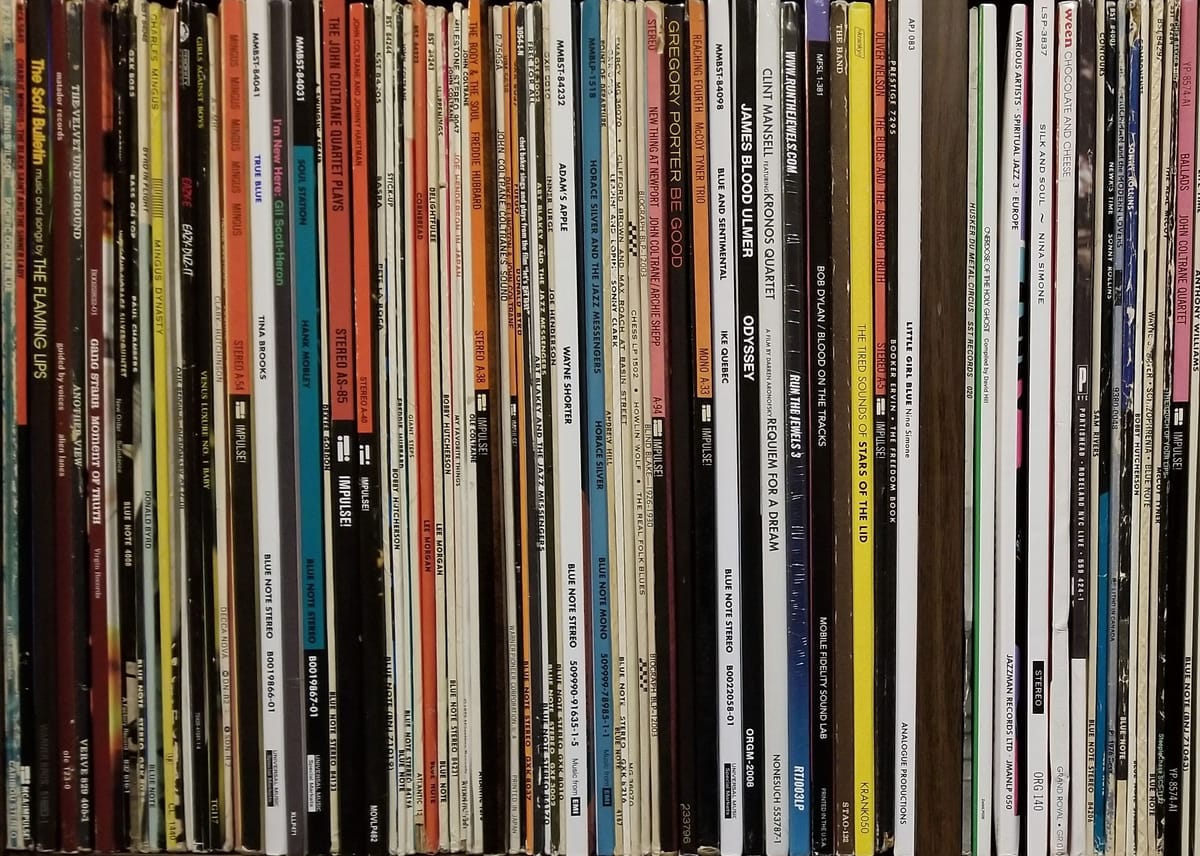
I buy jazz, rock, folk, blues, R&B, soul, Afrobeat, metal, ambient, funk — in fact, I’m open to most genres.
I do not buy classical records, easy listening, military or marching bands, or 60s/70s pop vocal (Barbra Streisand, Ann Murray, Paul Anka, etc.). I also do not buy 78s, cassettes, or CDs.
Below is the 3-step process I’ve used for buying vinyl since 2005.
For those who really want to understand the process, a more exhaustive explanation of who I am and why you should sell your records to me follows.
- What Have You Got?
Take a quick look through the records you wish to sell. Ensure they’re in decent condition and determine the approximate quantity (in number or feet) and the general gist of the genres (“mostly rock”, “half jazz; half blues”, etc.)
- Get In Touch
Contact me with the info gathered in Step One. We’ll set up an appointment so that I can view your records.
- Get Paid
Once I’ve gone through your records, I’ll make you an offer on the titles that appeal. If the offer is agreeable to you, I’ll complete the transaction by paying you on the spot by etransfer. It’s that simple.
Who am I?
My name is Lincoln Stewart. I’m the former manager of Vortex Records and the former owner of Good Music, two much-loved and well-respected Toronto record stores.
Both establishments had sterling reputations for fairness and quality. Vortex was the most highly-thought-of used record store in Toronto for almost 40 years, with The Toronto Star calling us “an oasis for music lovers,” and more than a dozen “Best Record Store” wins and nominations in the local newspapers’ annual “People’s Choice Awards” (Now Magazine, Eye Magazine, The Grid, The Toronto Star, etc.).
I now buy and sell top-shelf used records out of my Dundas West loft. Don’t let the lack of a storefront scare you — it’s by choice, having sold the entire inventory of Good Music to a competitor and entering semi-retirement in 2016 at age 48.
My Motto
My motto is Quality records bought and sold. Fair prices in and out. That means I’m not trying to screw you.
I pay half of what I intend to sell a record for. Period. If I’m gonna sell it for $20, I’ll pay you $10. If I think I can sell your record for $50, that’s $25 in your wallet. It’s that simple.
Unlike some of my competitors, I do not advertise that I “pay up to 60%” and then pay you good money for two records and pennies for everything else. If I want the record — and admittedly, I’m very picky — I’ll pay you 50%. Doesn’t matter if it’s a $75 record or a $750 record. No exceptions.
Importantly, I don’t expect you to be the expert. Maybe you don’t know you’ve got an $80 record. I’ll tell you — when I offer you $40.
I have bought and sold vinyl in Toronto since 2005. It’s what I do. Over the years, the stores I’ve run have paid out over a million dollars for people’s used items.
I’ve bought from those who’ve inherited records they know absolutely nothing about and I’ve bought from the most informed record collectors in the city — and every type of seller in between. Everyone gets treated the same way and I have the testimonials to back that up.
Most important to me is my reputation: the amount I offer a for a record is based solely on that record’s resale value to me, not on how much profit I can make on the title. This policy is the direct opposite of many of my competitors who want to pay as little as possible and sell for as much as possible.
Condition
Please keep in mind the first part of my motto: “Quality records bought…”.
Because I guarantee everything that I sell, I am not interested in unplayable records. I do not sell — and therefore do not buy — records with audible scratches on them. If you can feel a scratch with your finger, the turntable will hear that scratch and therefore the record is not of interest to me.
I also do not buy records that are missing the outer sleeve (the cover art) or records with cover art that is severely water damaged, unless the pressing is particularly rare and the record in great shape.
True, I am probably the pickiest buyer in the city. But this is why I pay so well — I only purchase quality product and do not clutter my inventory with dollar records.
What kind of records do I buy?
I am interested in most genres, but have a reputation for late 40s to present day jazz, blues, soul, rock, and indie. The rarer the record is, the more likely I’m interested in it. Labels that are of particular interest are Blue Note, Impulse, Okeh, Chess, Atlantic, Contemporary, Folkways, Verve, Prestige, and Mosaic. I also carry a lot of audiophile pressings from labels like Analogue Productions, Music Matters, Classic Records, Mobile Fidelity Sound Labs, and others.
Non-domestic pressings (Japanese, UK, and American imports) are also of interest, as are smaller / indie labels (SST, Cherry Red, Rough Trade, Creation, Factory, etc.) or micro labels (Mississippi, Type, etc.).
Unsure what any of that means? Doesn’t matter. Again, I’m not expecting you to be the expert.
Why choose me?
For all the years I’ve owned or run record stores, I was the only store in the city with “fair” offered as an explanation of what I paid. It was on my signage and business cards. I was also the only store to state clearly and upfront my buying percentage: fifty percent.
Other stores have now added “fair” to their own mottos — and at least two are lying that it’s always been their motto.
I have a hard-earned reputation for fairness, honesty, and transparency, though admittedly I can be a little blunt.
Though 75% of the people who sell records to me are repeat sellers — they’re my most vocal supporters (and some of them have been selling to me since 2005) — one of the most satisfying parts of my job is paying big money to people who don’t know the value of a rare vinyl gem tucked next to their beat up copy of Fleetwood Mac’s Rumours.
What's the process?
It’s best if the records are brought to me. You can drop them off at my building and I’ll bring them inside (I do all the lifting). You’re welcome to wait in your car or explore the Roncesvalles neighbourhood, grab a coffee or a bite, and I can call you when I’m finished and you can return at your leisure to discuss my offer.
Depending on the quantity of records, it could take under 30 minutes or several hours. If it’s the latter, you’re welcome to return for pickup the next day, but it’s not possible to leave the records indefinitely as I do not have the space.
What's next?
To determine if I’m interested in your records, it is best if you send me some basic information. Most importantly, which records do you have to sell and what condition are they in. Please be specific — vague terms like “All kinds of music” or “Everything” are not helpful.
For instance, “I have 3 crates of records, mostly fifties and sixties blues and jazz (Miles Davis, John Coltrane, Charles Mingus, etc).” is helpful, as is, “3 feet of rock records from the seventies. Led Zeppelin, Black Sabbath, Pink Floyd, Beatles, and other popular bands of the era.”
But… “A pile of vinyl records from when I was in high school! I’m not sure what they are as I haven’t looked at them in years!” is not so helpful.
If the records aren’t yours (perhaps you inherited them or moved into a space filled with vinyl from a former occupant), and you know nothing about them, you can call me and I can ask you questions about them that you’ll easily be able to answer, assuming you’re in front of the records.
One of the most useful things you can do is send photos of the spines of your collection, like this:
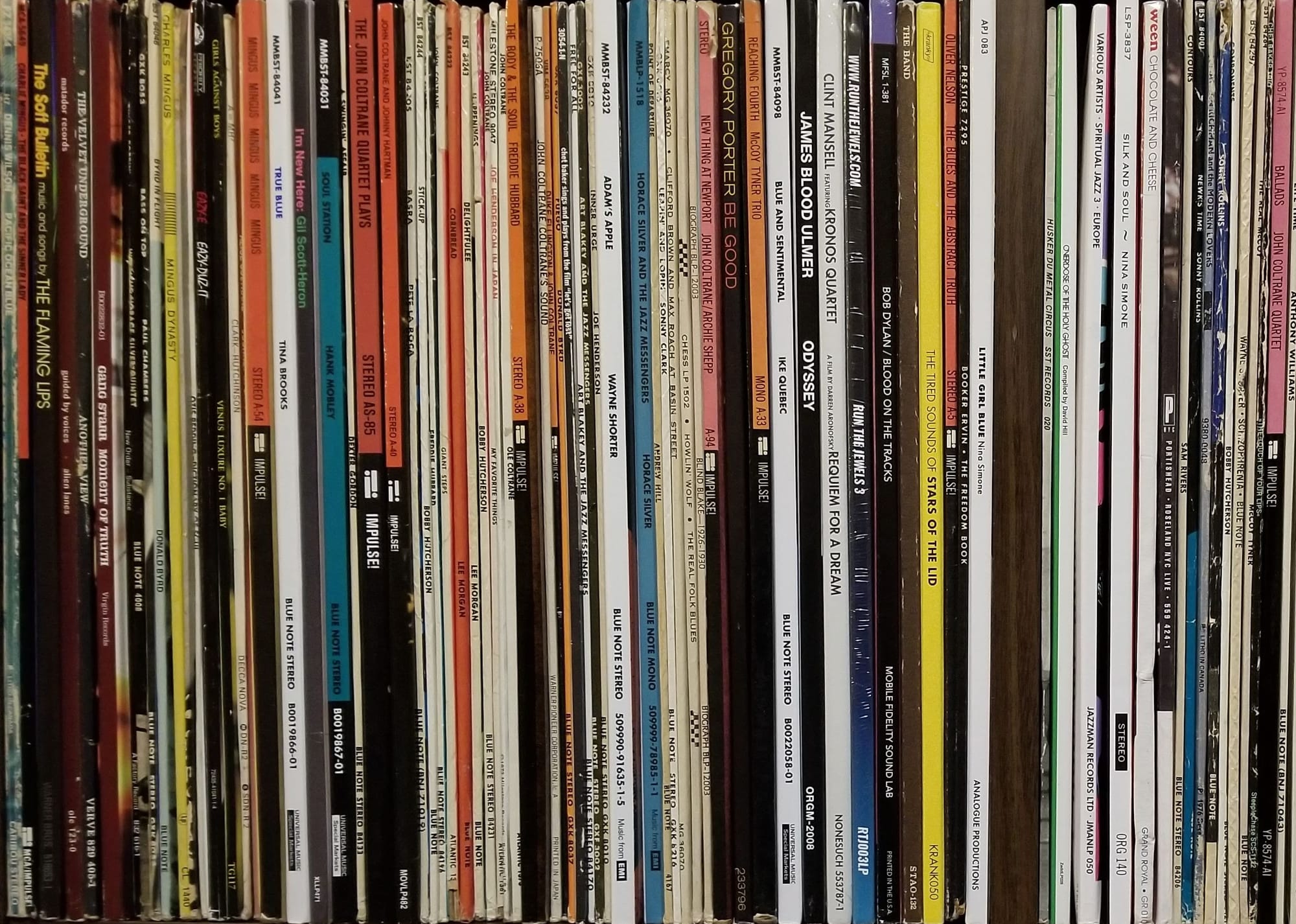
Your photos don't have to be as squared up as that one, but the spines need to be legible so be sure to hold the camera steady and shoot as hi-res as you can. About a foot's worth of records per photo is best.
Some people have gone to the trouble of making detailed spreadsheets with titles, catalog numbers, etc. Though this is nice, 90% of the time it is a wasted effort as it takes many hours to do and it isn’t necessary for me to know that much information about every record before determining if they’re of interest. If you haven’t done this yet, I would advise you to spend your time otherwise.
More than likely I’ll get back to you with a few questions and then perhaps we’ll talk briefly on the phone.
If you prefer to call rather than email, my number is 416 556 6278. Please try to have access to your records when you call, as I’ll certainly have some questions about them.
That is probably more than enough information for you to decide on next steps, but for those of you who want more information, here are some frequently asked questions about selling records to me or selling records in general:
You say you pay the best in the city. What makes you so sure?
Actually, I don’t say that. People who repeatedly sell records in Toronto say that about me because they have experience repeatedly selling records in Toronto. I do say that I pay half my sale price for every record I buy. More importantly, I don’t just say I pay 50% — many of my competitors now say it — but I actually do it.
A number of my competitors say they pay “at least 50%” or “the most” or “the best,” but when they’re buying a record from you, they’ll pay you $20 and tell you it’s worth $40 and then sell it for $60 or a $70.
This happens most frequently when they’re buying all of your records because they know you’re not going to come into their shop to verify what they’ve told you — if you still had an interest in records, you wouldn’t have sold them your collection!
All my sales are done through my website (I do not sell on eBay or Discogs or other online services and I do not participate in record conventions or shows — the one exception is I participate in the annual Roncesvalles Street Festival as I'm a strong believer in community) and the prices are visible while the title is for sale. If I tell you a record is worth $40, you’ll end up seeing it listed on this website for $40.
Here’s a fact: when the staff (current and former) of many of Toronto’s best-known record stores have valuable records to sell, they call me rather than selling to their own employers. This includes my competitors who insist they also pay half. Why? Because they know their employer’s claims are nonsense. Back when I had traditional stores and my employees had records to sell, they sold to me, not to my competition. They worked for me every day and knew that I paid what I said I did because their own jobs consisted of paying 50% to every seller who came in the door.
You say you pay 50% for every record and imply your competition doesn’t. How do you know for sure?
One of the reasons I’m still able to pay 50% for every record I buy is because I’m just me. Every record store in Toronto is “a family business” — there’s nothing special about that, but my family is just me and my dog. I don’t have a traditional storefront and all that comes with it (insane Toronto rent, insurance, utilities, advertising, BIA, TMI, etc). And, I don’t have staff.
Having owned and managed stores for many, many years, I know how much these things cost. Keep in mind that, generally speaking, if a store pays 50% for their inventory, they don’t make a dime in profit until they sell 51% of that inventory. It is extremely difficult to pay staff a decent wage and manage Toronto commercial rents when half your money has gone to non-returnable inventory. This is why I say I sell out of my loft by choice — it’s also why I do not begrudge stores that pay 30% — which was the standard before I got in the business and, if stores are honest, is still the standard today. They’re not ripping you off — they’re making a decent living. My store was on Dundas and my rent was $1200 because I was lucky enough to have a landlord I had history with prior to opening there. But rents on Dundas are now triple that. Queen Street? Danforth? Spadina? Forget about it. And with multiple staff? In my opinion it’s not difficult to run a brick-and-mortar shop in Toronto and pay 50% across the board for used records — it is literally impossible.
One other important factor is this: I generally only buy a fraction of the records offered to me. What happens to the records I pass on? Unless they’re dreadful records, they end up in the bins at my competitors. Often those are competitors that I recommend. And, because I need to keep on top of who’s treating my referrals well, I follow up with people to find out how it went, what they were offered, and what they thought of the experience — those customers tell me what they were paid and I use that information to best steer future referrals. Not once has it been 50% across the board. In almost 20 years of referring.
Your competitors insist I not sell individual pieces, but that it’s better to sell them as a whole lot. You prefer to only buy the rare records. Why is your system better for me?
This is a negotiating tactic used by stores who pay a flat price per record, something I do not do. Basically, what they’re doing is discounting the cherry items to the price of the common items by implying the common items are worthless. Some even have the nerve to imply they’re doing you a favor — “I’ll take them off your hands…”
If you really want to get into the weeds on this, below are two real examples you can read — they're long — or just scroll through to the next question.
Example One
September, 2020: Mark comes to me with approximately 300 records. I spend a few minutes with the records and find 51 that I want.
I spend another 35 minutes checking their shape. I offer him $784 for those 51. He declines my offer and takes all 300 to my competitor who flips through them for 5 minutes total and makes a low-ball offer. They negotiate a bit and my competitor peaks at $950 for all 300. Mark declines and takes the records home.
Mark gets back in touch with me and says he’s interested in my offer but asks, “What about the other records?” I tell him they’re worth $2 to $6 each, but not to me, as they do not fit my business model. Mark does not believe that the records I do not want are worth so much and that dealer number 2’s offer was so low. “Really?!” he asks.
I tell him, “Take them around town if you want. I’ll still give you $784 for those 51 and if you can’t find someone to buy those others for at least $2 each, I’ll buy them for $2 each on top of the $784 because I don’t want you to get screwed — but, I think they’re worth more than that so suggest you try some other dealers,” and I offer him some suggestions.
Unfortunately, due to Covid, no shop is willing to do a housecall. Tired of lugging the records around, Mark contacts another dealer unfamiliar to me who flips through the records, but they can’t come to an agreement.
Mark gets back in touch with me a week later and I buy all the records for the agreed-upon price.
In the first example, the 51 records that appealed to me would retail for 2 x $784, meaning $1568.
My competitor — the second dealer Mark brought his records to, who goes to great lengths on their website to insist they are “fair” and “50% or higher” yada yada yada… was either a) telling Mark that all 300 records were worth $1900 (2 x $950) or, if they were going to price the fifty-one I wanted at market prices ($1568) that the other 249 records were worth 67 cents each ($950 – $784 = $166 / 249 records), or, if that’s half, that they will be sold for less than $1.40 each. As I already explained, I expected a reputable dealer to offer $2 to $6 each. So this other dealer was saying the retail value was less than I was claiming a reasonable wholesale value would be. Sorry, not sorry, but this is bullshit — and this is the problem when someone makes you a flat offer on all your records.
Records I pass on are not necessarily worthless. They just don’t fit my business model. In this example, I did a nice customer a favor by buying records I didn’t really want because I knew he had no options due to the pandemic.
It felt good to help him out, but in the end I regretted it because dealing with records worth $10 and under is not worth my time. Unlike my competitors with browsable storefronts, I can’t just slap a price tag on them and stick them in a bin. I have to photo them, crop the photos, write a description of each one, and then post them online and hope someone wants to book an appointment to visit to purchase an item they can probably find in most decent record stores. It just doesn’t make sense and I won’t make this mistake again. (Sorry if you were getting excited reading it thinking I’d take things I really wanted to pass on.)
Example Two
July, 2020: John sends me a spreadsheet of 1000 records.
I go through it and tell him there are 62 I would be interested in if he can bring them to me. He wants to know how much they’re worth to see if it’s worth the trip. I tell him I can’t price records without seeing them but if they’re in decent shape and the least desirable pressings of those records it’s a minimum $350, but it should be more. He decides to make the trip but realizes he only has 58 of the records (the list was made 20 years ago and they must have went astray in the meantime).
I spend 30 minutes with the records and offer him $890, which is half what I intend to sell them for. Knowing that I could have offered him $350 — a number that we both know was high enough to have him come to me — John knows I’m not trying to screw him and accepts.
He asks me where he should take the other records. I reach out to some of my competitors to see who’s looking for records (this is during the Pandemic — many are closed).
One competitor, who I have never referred anyone to before, insists he will buy them all as he’s desperate. I pass that info to John and, using the list he sent me, highlight the most valuable remaining records and what he can expect for them.
A few days later, John mails me and tells me the guy does not want them all and has offered $1400 for the ones I highlighted. I think that offer is low and tell him I will try and find another buyer. I also confirm my text from the competitor that he told me he “would buy them all”. This angers me and I tell the competitor so, as I feel he’s wasted the seller’s time and made me look a liar. I suggest he make a better offer. John and the competitor talk some more while I look for another buyer. John gets the competitor to $1800 for all, which is still low. No other competitors are open and buying and I tell John he should return to the competitor and negotiate further as I think he’s out of options unless he wants to wait until after the Pandemic. John talks to the guy further and talks him up to $2400, which he accepts and that I agree is fair.
Keep in mind this competitor insists they pay half — how is this possible when his initial offer of 1400 is more than 40% lower than his final price?! Due to what I consider unfair treatment, I cross that dealer off my referral list for good.
Many of my competitors will low-ball. It is part of the culture in most used markets — cars, antiques, records. I do not. I make one firm, fair offer and I never budge.
This is why I say it’s a negotiating tactic by my competitors. They know most sellers don’t know they’re being ripped off and will accept it.
Because I offer 50% out the gate, I don’t need this tactic. If the seller wants more, I simply decline and walk away. This isn’t Marrakesh and I’m not interested in haggling.
You say it can take 30 minutes to a few hours to go through my records and make an offer. My friend sold his entire collection to one of your competitors and it only took 5 minutes. Why the difference?
Your friend got ripped off.
No doubt the buyer flipped through the records and made an offer based on the covers. Only an amateur or a crook buys records based on covers, and my money’s on the latter.
Take a second and hover your mouse over that John Coltrane cover (or tap it with your finger if you’re on a phone). See it flip back and forth? Sure, one image is a little faded, but they’re the same record, right? Yup.
But they’re not the same pressing.
Huh?
The pressing is what determines a record’s value. Anyone who makes an offer on a record, let alone a collection, without examining what’s inside the cover, is terrible at their job. Or — and this is more likely — they’ve been doing this for decades and they’re deliberately simplifying the buying process to benefit themselves. Would you buy a car without lifting the hood or opening the doors? Record resellers deal in pressings, not covers, and you can’t be certain of the pressing without looking at the record and label.
Here, take a look:
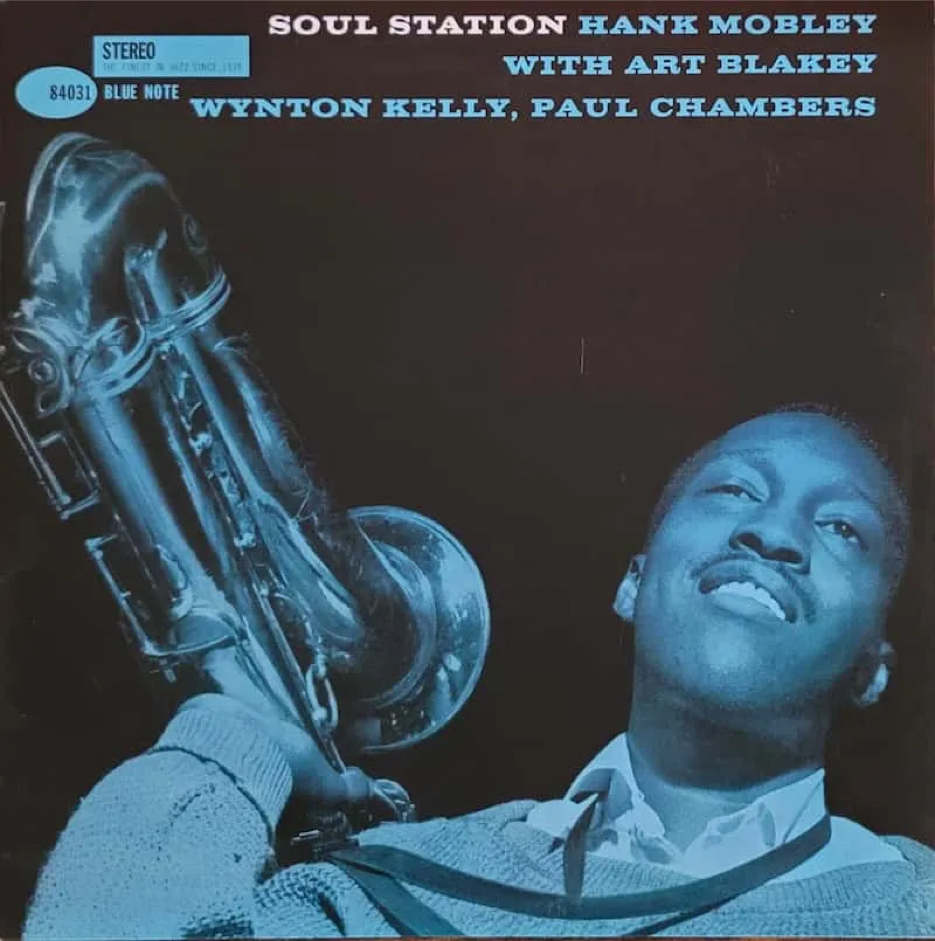
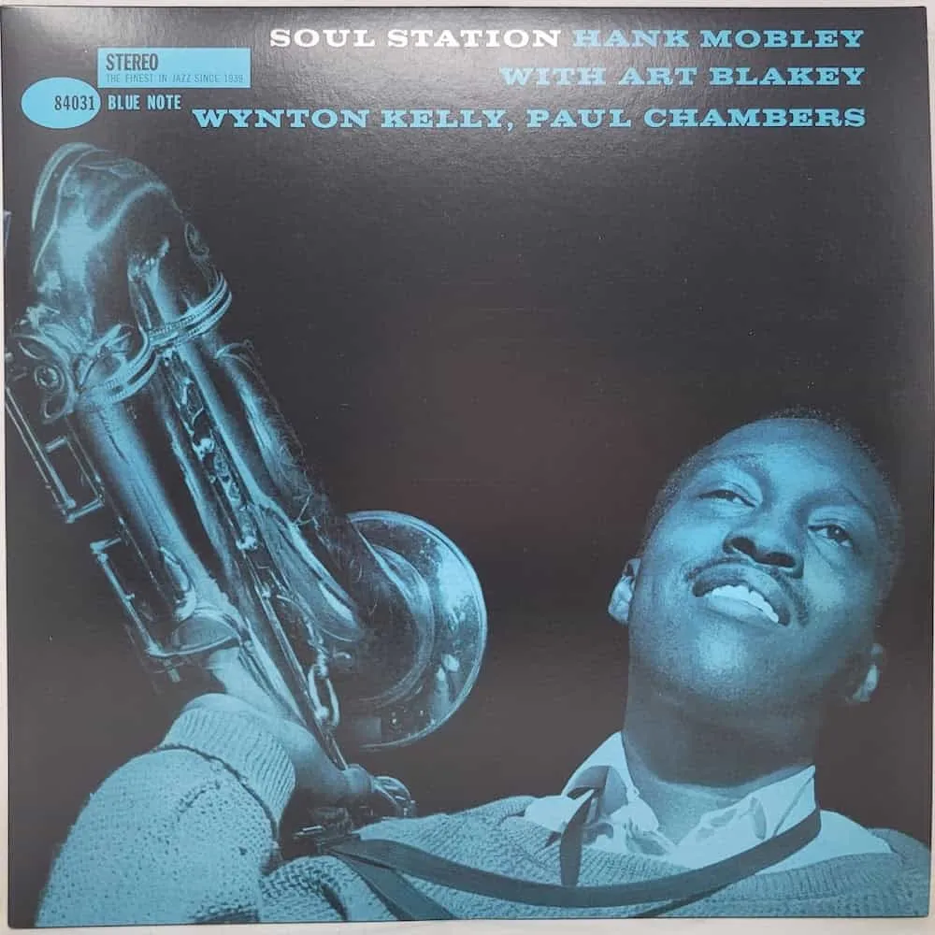
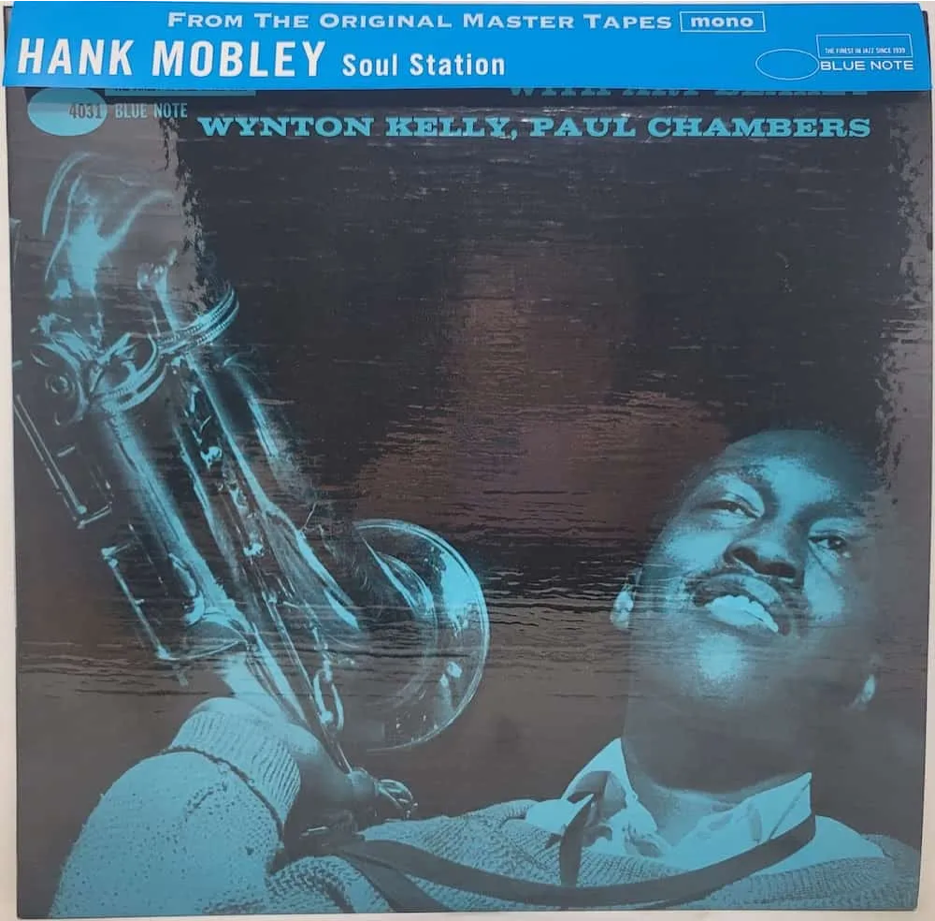
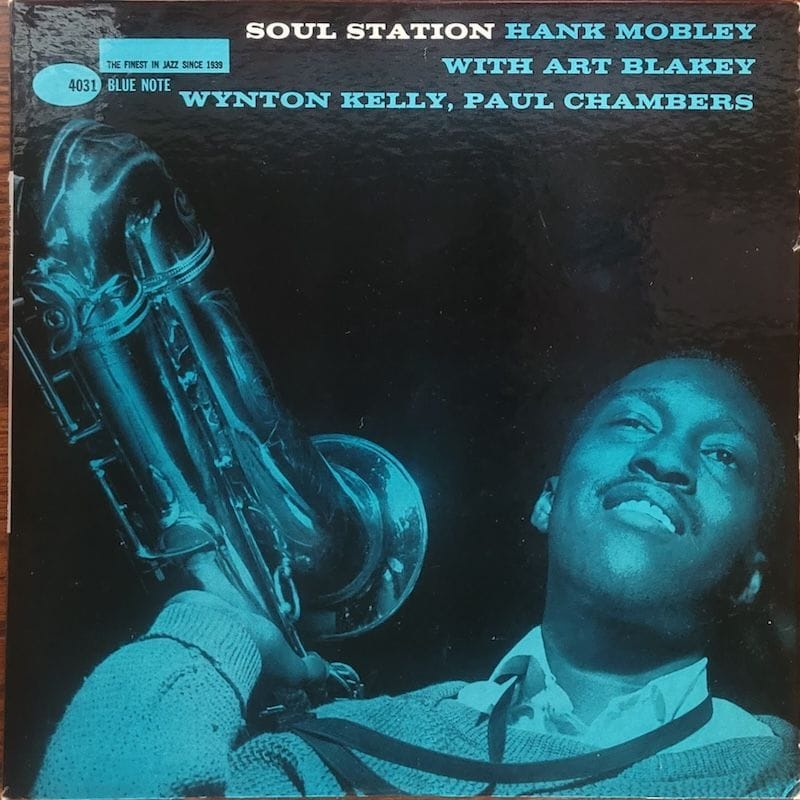
That's four different copies — and therefore four different pressings — of the Hank Mobley album Soul Station. They look almost identical, right? Yup. As a record dealer, how much should I pay you for these records? If I only look at the covers, they should all essentially have the same value, correct?
But by looking at the records and the labels, I find out that the first one was pressed in the US in 2015, the second in Europe in 2019, the third in Japan in 1990, and the fourth in America in 1960.
What would they sell for? As I type this: $20, $35, $195, and $2200. That's right, twenty two hundred dollars!
With that big of a price variation between these four seemingly identical records (manufactured sixty years apart), how can a buyer assess value by flipping through the covers? They can’t. But if that’s what they’ve been trained to do and have been doing for decades, do you think they’re going to value that record at $20 or $2200 when they’re trying to decide what to offer you?
It would take me a few minutes to determine the provenance of this one record alone. An entire collection? Trust me, your friend got taken for a ride.
Here’s another example from a housecall I did:

At the time of the buy, this original pressing was worth about $100. However, opening it up, I found this label:
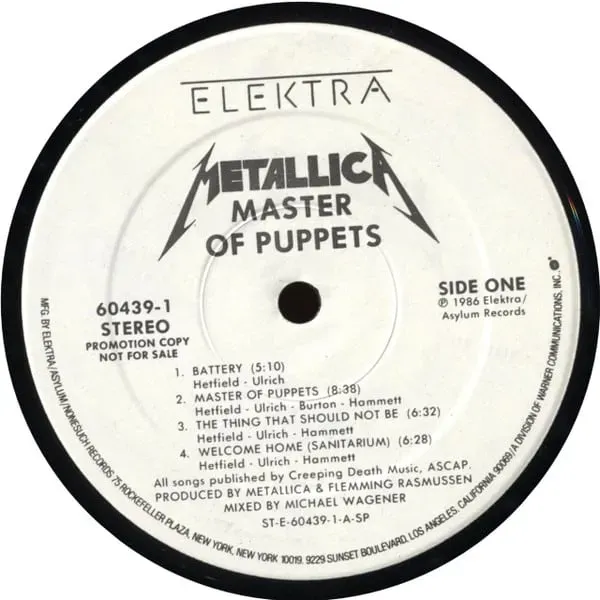
As you can see, it says “Promotion Copy Not for Sale”. Much more rare than the general release. The album went from a $100 record to $185 record because I was thorough enough to check the label. Of course, I then paid $93 to the seller instead of $50. (You can read the record owner’s own account of our transaction on her blog.)
So, in order to make an accurate and fair offer on your collection, I need to examine every record I’m going to pay you for in detail. (I don’t bother opening the records that don’t interest me.) I identify the pressing based on all sorts of factors: groove depth, label color and paper, font, logo style, company address, parent company name, scribbles and stamps in the deadwax or runout, cover (paper texture, printing method, and assembly type), country of origin, format (stereo, mono, fold-down), etc. I do this very quickly — 30 seconds or less — unless it’s a particularly rare pressing (like the original Mobley above) or one with many variations.
If you don’t have the time for me to do that, I understand. There’s more to life than getting the most for your records — maybe you just want them gone. If that’s the case, there are plenty of people in this business who’d be happy to make you an offer based on the covers. I’m just not one of them.
Some stores offer a “guarantee” or “promise” that they pay the “fairest”. Do you?
Short answer: No.
EDIT: The owners of the shop that was doing this have read my website and have now removed their “guarantee” from their own website — worse, they replaced it with false claims that they would never say they guarantee such a thing. So, essentially, you can skip the answer to this question as, to my knowledge, no Toronto stores are currently offering guarantees. But, I’ll leave the answer intact for those who are curious:
Long answer: Those guarantees and promises aren’t worth the pixels they’re written with. Think about it — how would such a guarantee be backed up? Once you’ve sold the records, you’ll not get an offer from another buyer so you have nothing to compare it with. Further, what if you passed on their offer and got a better offer from someone else — what is the store with the guarantee going to do? Match the offer? Why would you drag the records back to them to get the higher amount the second store was offering from the git-go?
The only reason a store makes such a silly claim is to take advantage of neophytes. They know they’ll never have to back it up. Avoid buyers with guarantees. If they’re not charlatans, at the very least they’re not respecting your intelligence.
Another fact: in my years of buying records, my offer to purchase a collection has only been turned down twice. Why only twice out of, literally, thousands of buys? Because I’m so great at my job? No.
It’s because selling a record collection can be an intimidating, frustrating, and back-breaking process: you’ve got to do your research, possibly book an appointment, pack up the records, lug them to the car, drive to the store, carry the records from car to store, wait while the buyer goes through them, often be belittled by a buyer trying to make it look like you’ve got nothing of value, listen to and weigh their offer…
Then what?
They said on the phone or on their web site that they’re fair. Maybe you don’t know anything about vinyl or the current used record market. So — are they being fair or are they preying on your ignorance and exhaustion? After all that work, should you put the records back into the car, drive back home, and repeat the process with another buyer who will probably make a similar offer? Most people won’t. They’ll take what they’re being offered. That goes for people selling to me as much as it does for people selling to anyone else. It’s human nature.
This is why it’s important to pick the right buyer first.
I’d love the opportunity to consider your records, but if you’d rather go with someone else, here’s a list of my competitors.
If you choose Volver and your records aren’t right for me, I’d be happy to make a personal recommendation for one of the other stores on the list to ensure you get treated as fair as possible. I’ll even check back with you to ensure your experience with my competition was worthy of my recommendation, just like I’ve done after hundreds of referrals over the years.
There’s one other thing you could do before making your decision. Read testimonials from my customers.
If you have other questions, or wish to talk to me about your records, call 416 556 6278, or send me an email.
Best of luck, and thanks for your consideration.
Lincoln